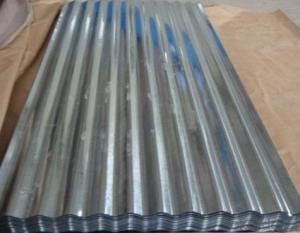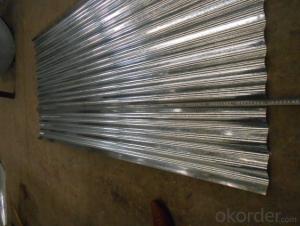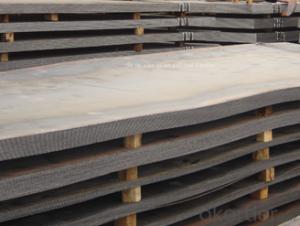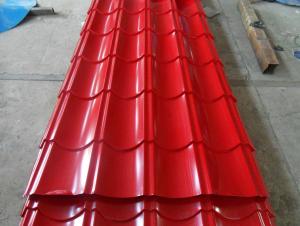Hot-Dipped Corrugated Metal Roofing Sheet
- Loading Port:
- Tianjin
- Payment Terms:
- TT OR LC
- Min Order Qty:
- 25 m.t.
- Supply Capability:
- 20000 m.t./month
OKorder Service Pledge
OKorder Financial Service
You Might Also Like
Item specifice
Product Brief Introduction
Hot-Dipped Corrugated Metal Roofing Sheet
--- Corrosion resistance: Pre-coated steel offers excellent corrosion resistance achived through continuous hot DIP galvanization and corrosion resistant primer/polyester coating. Protection is achieved when zinc and steel are together in the presence of moisture; The zinc protects the steel by galvanic action
Product Features
. Traditional aesthetics outlook
. Suitable for new house or renovation.
. Less joints, watertight
. Long life service
. Tedun also provide relative ridge cap, fasteners and other accessories
Product Specification
Standard:ASTM, GB,JIS,JIS G3302 ASTM 755 EN10169
Grade: DX51D CGCC CS
Thickness: 0.13mm~3.0mm,
Width: 1250,600-1250mm
Coil weight:3-12 MT
Coil ID:508/610mm
Chemical composition:
C | Si | Mn | Cr | Ni | P | S |
0.150 | 0.476 | 11.231 | 12.50 | 0.900 | 0.039 | 0.010
|
FAQ
How long will we receive the goods ?
45days after receiving workable L/C
how do you control the quality ?
we have our own quality control department ,we will arrange QC person to see the production line ,when goods finish ,before shipment ,our QC person will check the quality as per our test report request ,if the goods is ok ,then we issue the test report ,and we allow the goods shipping ,otherwise will not allow ship the goods.
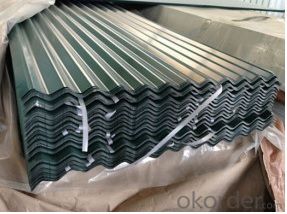
- Q:What is the maximum temperature resistance of steel sheets?
- The maximum temperature resistance of steel sheets varies depending on the specific type of steel and its composition. However, in general, stainless steel has good heat resistance and can withstand temperatures up to about 1200 degrees Celsius (2200 degrees Fahrenheit) without losing its strength or structural integrity. High carbon steels, on the other hand, can handle temperatures up to about 900 degrees Celsius (1650 degrees Fahrenheit) before they start to lose their mechanical properties. It is important to note that these temperature limits are approximate and may vary depending on factors such as the duration of exposure, the presence of other elements or impurities in the steel, and the specific application in which the steel sheets are being used. Therefore, it is always advisable to consult the manufacturer's specifications or conduct further research to determine the exact maximum temperature resistance of a particular type of steel sheet.
- Q:Are the steel sheets resistant to impact or denting?
- Yes, steel sheets are generally resistant to impact and denting due to their high strength and durability.
- Q:What kind of material does ordinary steel plate refer to in steel market?
- This is not difficult to understand. The chemical composition of ordinary steel is very simple. It is only made of carbon and iron. But the alloy steel plate is according to the different design request and the construction request to deploy its chemical composition, the different design request will affect the alloy steel plate in the choice alloy element choice.
- Q:What safety precautions should be taken when handling steel sheets?
- When handling steel sheets, it is important to take several safety precautions. Firstly, workers should always wear appropriate personal protective equipment (PPE) such as gloves, safety glasses, and steel-toe boots to protect themselves from potential injuries. Secondly, workers should be trained on proper lifting techniques to avoid strains and back injuries. It is also crucial to ensure that steel sheets are stacked and stored securely to prevent them from falling and causing accidents. Additionally, workers should be cautious of sharp edges and corners on the steel sheets and use appropriate handling tools or equipment, such as clamps or lifters, to minimize the risk of cuts or injuries. Regular inspections of the steel sheets and the work area should be conducted to identify and address any potential hazards promptly.
- Q:What is the average lifespan of a painted steel sheet?
- The average lifespan of a painted steel sheet can vary depending on various factors such as the quality of the paint, the environment it is exposed to, and the maintenance it receives. However, on average, a well-maintained painted steel sheet can last anywhere from 20 to 50 years. It is important to note that regular inspections, cleaning, and touch-up painting can help prolong the lifespan of a painted steel sheet. Additionally, factors such as exposure to harsh weather conditions, extreme temperatures, or corrosive environments can significantly impact the longevity of the paint and the sheet itself.
- Q:Can steel sheets be used for marine applications?
- Yes, steel sheets can be used for marine applications. Steel is often used in the construction of ships, barges, offshore platforms, and other marine structures due to its strength, durability, and resistance to corrosion in saltwater environments.
- Q:Are steel sheets suitable for food processing industries?
- Yes, steel sheets are suitable for food processing industries. Steel is a highly durable and hygienic material that can withstand the rigorous demands of food processing. It is resistant to corrosion, easy to clean, and does not react with food or alter its taste. Additionally, steel sheets can be fabricated into various shapes and sizes, making them versatile for different food processing applications.
- Q:Are steel sheets suitable for HVAC systems?
- Yes, steel sheets are suitable for HVAC systems. Steel sheets are commonly used in HVAC systems due to their durability, strength, and resistance to corrosion. They provide structural integrity to the system and can withstand high temperatures and pressure. Additionally, steel sheets are easy to fabricate and can be customized to fit specific HVAC system requirements. They are also cost-effective and have a long lifespan, making them a preferred choice for HVAC system components such as ductwork, ventilation systems, and air handling units.
- Q:Are steel sheets suitable for wastewater treatment facilities?
- Indeed, steel sheets prove to be a fitting option for wastewater treatment facilities. The advantages they present render them a commendable choice for this specific purpose. Primarily, steel sheets exhibit a high level of resistance against corrosion, a crucial characteristic in wastewater treatment facilities where the presence of harsh chemicals and corrosive substances is prevalent. This resistance to corrosion guarantees the long-lasting and durable nature of the steel sheets, consequently diminishing the costs associated with maintenance and replacement. Furthermore, steel sheets have the ability to endure elevated temperatures and pressure, rendering them suitable for a wide array of processes involved in wastewater treatment, including filtration and separation. Additionally, steel sheets possess the quality of being easy to clean and sanitize, an imperative factor in upholding hygiene standards in wastewater treatment facilities. They can be effortlessly washed and disinfected, effectively preventing the proliferation of bacteria and other harmful microorganisms. Lastly, steel sheets are environmentally friendly as they can be recycled, thereby reducing the environmental impact of wastewater treatment facilities. In conclusion, steel sheets offer the requisite strength, durability, and resistance to corrosion, making them an apt choice for wastewater treatment facilities.
- Q:Can steel sheets be used for construction equipment?
- Yes, steel sheets can be used for construction equipment. Steel is a versatile and durable material that is commonly used in the construction industry for various applications, including equipment fabrication. Steel sheets can be shaped, welded, and formed into different components and structures needed for construction equipment, such as bulldozers, cranes, excavators, and dump trucks. Steel's high strength-to-weight ratio makes it suitable for heavy-duty equipment, providing the necessary strength and stability while keeping the weight manageable. Additionally, steel is resistant to corrosion, which is crucial for construction equipment exposed to harsh environmental conditions. Overall, steel sheets are a popular choice for construction equipment due to their strength, durability, and versatility.
1. Manufacturer Overview |
|
|---|---|
| Location | |
| Year Established | |
| Annual Output Value | |
| Main Markets | |
| Company Certifications | |
2. Manufacturer Certificates |
|
|---|---|
| a) Certification Name | |
| Range | |
| Reference | |
| Validity Period | |
3. Manufacturer Capability |
|
|---|---|
| a)Trade Capacity | |
| Nearest Port | |
| Export Percentage | |
| No.of Employees in Trade Department | |
| Language Spoken: | |
| b)Factory Information | |
| Factory Size: | |
| No. of Production Lines | |
| Contract Manufacturing | |
| Product Price Range | |
Send your message to us
Hot-Dipped Corrugated Metal Roofing Sheet
- Loading Port:
- Tianjin
- Payment Terms:
- TT OR LC
- Min Order Qty:
- 25 m.t.
- Supply Capability:
- 20000 m.t./month
OKorder Service Pledge
OKorder Financial Service
Similar products
New products
Hot products
Hot Searches
Related keywords
